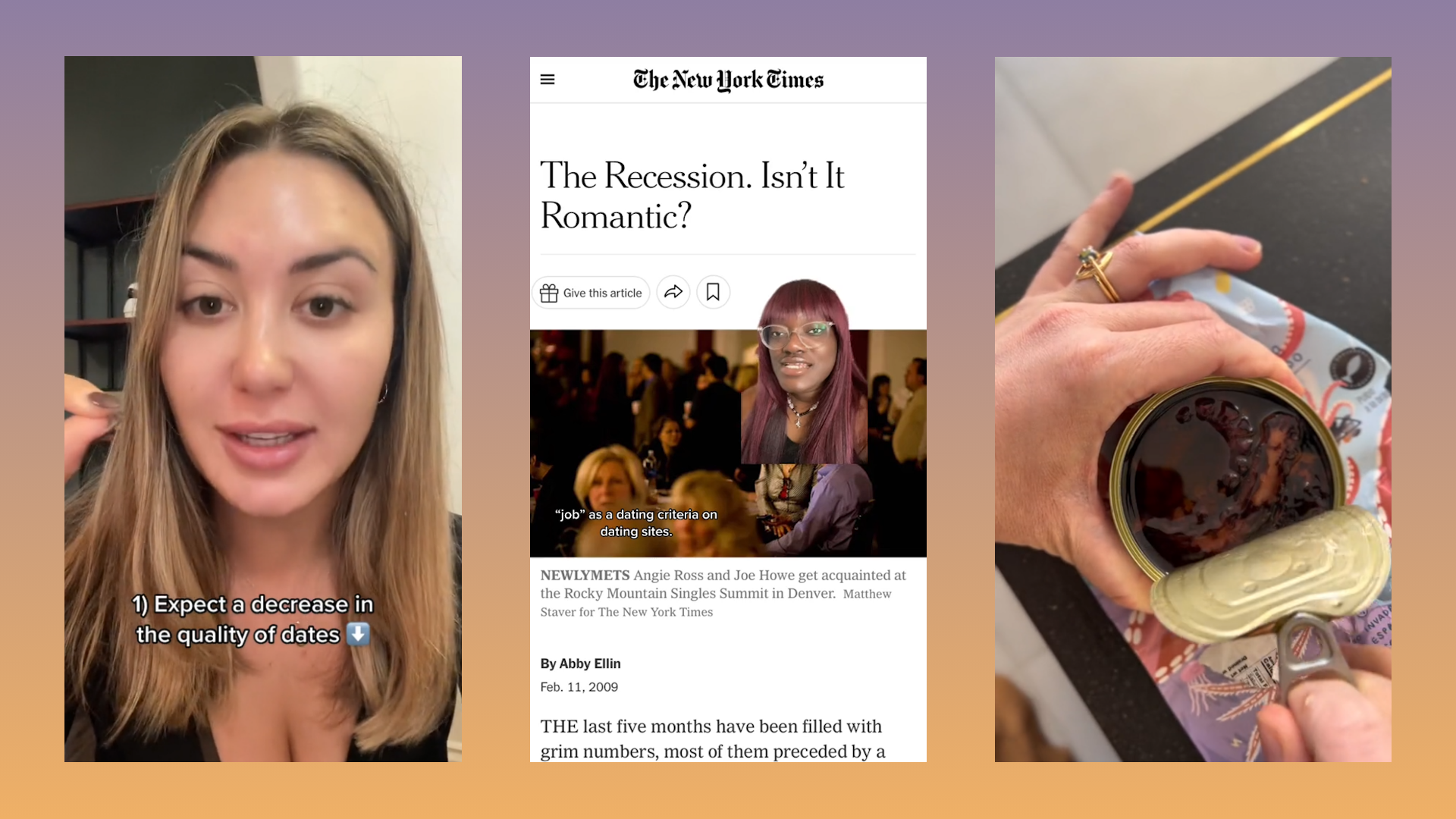While economists continue to debate if we’ve reached the point of a recession, TikTok has already turned the current financial crisis into an aesthetic. There’s “recession-core” (which essentially amounts to celebrities not wearing necklaces) and even the romanticisation of “tin fish date night”. Whatever way you look at it, people seem to be feeling the rising inflation rates and sky-high housing costs, and these current struggles are no doubt influencing the trend cycle. So where does that leave our love lives? Well, we’re re-entering the era of “recession dating”.
Periods of financial crisis have impacted the way in which people date throughout history, sometimes in unexpected ways. While money troubles can cause arguments in relationships, divorce rates dropped 25% between 1929 and 1933 during the Great Depression and more people were looking for love in 2009, during the Great Recession. Todd Baratz, a certified sex therapist and relationship expert, fears that this time around, people will be put off dating altogether. “The major shift I see is a decline in willingness to make relational commitments,” he says. “Not like exclusive or other defined relationships, but more like spending time with people who are strangers to date and slowly getting to know them.”
Todd says there’s currently a lack of motivation to “date vulnerably”. “Meaning [people] putting themselves out there, and opening their schedule in a way that prioritises romance, sex or emotional intimacy within those contexts,” he says. This makes sense when you consider that we all may be spending more time looking for extra work or apartment hunting (or just generally crying ourselves to sleep). Unfortunately, this can have a detrimental impact on our health. “Social fitness” (or having positive relationships), according to an 85-year-long Harvard study, was found to be the number one factor to living a long, happy life — over career achievement, money, exercise, or even a healthy diet.
Lucy, a 24 year old in New York, has already sworn off dating recently after receiving judgment about her finances. “I’ve found men are super judgemental when I discuss my mix of jobs skewing away from my dream career,” she says. “My last date seemed put off that I wasn’t able to make money off my main creative career. He was a successful artist himself, so I decided to take a break from dating whilst I’m figuring it out.” With the term “dating down” (entering a relationship with someone of a lower income) being thrown around, low-income groups can end up feeling like the dating space is something they have to work toward, instead of the search for love being just part of the human condition. “‘Dating down’ just feeds into the fact that y’all think everything romantic is transactional,” one person tweeted.
While going on a date without monetary resources can be uncomfortable, the idea of us all getting our financials in order before we’re ready for a relationship is a common ideology in the “red pill”–adjacent spaces. “Your money must be right before you worry about women,” says one TikTok creator. This is a surefire way to keep people lonely and isolated through tough financial periods (that can last years). Instead of leaning into the hyper-individualistic culture, which has sex and dating rates dropping for Gen Z, Todd encourages people to continue to pursue romance through vulnerability.
“Romance isn’t about an activity, and you don’t need fancy date nights or anything to be romantic,” he says. “People often forget how powerful their words are. Hiding notes in your partner’s lunchbox telling them how much you love them, sexting during the day, fantasising about the future — all of these things are free. Money isn’t required to express love or experience romantic connection.” This means putting aside the modern dating game of who cares less, having more open conversations, and having them earlier on (something dating app culture could benefit from as a whole).
Continuing to date throughout financial strife also means being more open and compassionate with your date, something a TikTok dating coach encourages in a video on recession dating. “Don’t be surprised if your date whips out a coupon when the bill comes,” she says. Dr. Lexx Brown James, a sex therapist based in Pennsylvania, says she’s already seeing couples adapt by returning to “nostalgic memories”. “There are listening parties and ‘staybaecations’,” she says. “Lovers are getting creative with their limited resources and finding they are having fun in getting to know each other intimately whether that’s over a board game or playing cards.”
Dr. Lexx Brown James says she’s also seeing singles get more open-minded about who they date, zooming in on the most specific and important qualities to them. “People are also more selective with whom they’re choosing to spend time with, and are willing to stay alone rather than waste precious time with someone they know they aren’t compatible with,” she says. “In this recession, there is so much loss, and work stress is at an all-time high. There is a high value placed on those who can make and sustain a home because the world is on fire and people want a reprieve.”
It would be naive to say that finances don’t play a role in dating. It’s also understandable to have financial expectations when it comes to long-term partnerships. However, with a new Hinge survey showing that we’re “over hook-up culture” post-Covid and more people coming forward as self-identified “romantics” online, there’s a case for throwing away the rule book on how much money people need to have to enter the dating space. There’s also a strong case for going on less “traditional” dates — think a picnic in the park, a trip to a gallery, or even, you guessed it, a spread of tinned fish. After all, times are tough. Everything is more expensive, and if we’re being forced to weather any sort of turmoil, financial or otherwise, it may as well be with a bit of romance.

